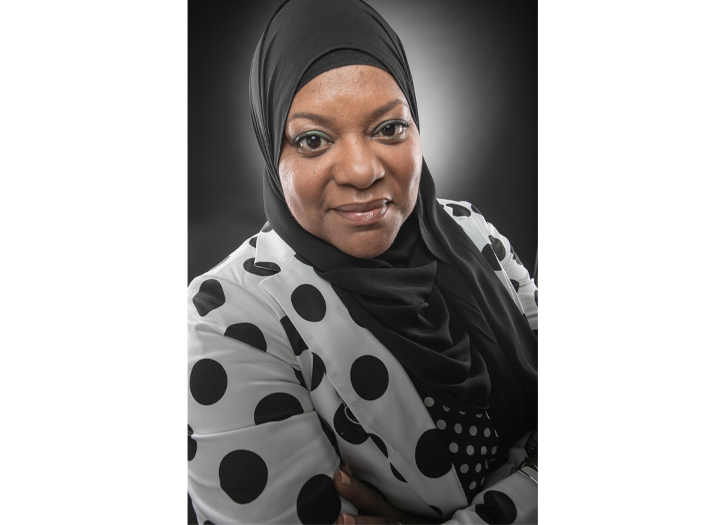The We Wear the Mask film, which is executive produced by Halima Tammy Thompson and directed by Michael Savisky, is now available to purchase on Amazon. The psychological effects of poverty are far-reaching and women are statistically more likely to feel the impact. The film follows three women who share their perspective on poverty. Dominique, Veniecia, and Lou Ann lead vastly different lives, and yet their stories intersect and parallel in surprising ways. Sheen had the chance to sit down with the executive producer of the film.
Which struggles that the three characters experienced, do you believe are universal for women today?
Unfortunately, I think one of them is the breakdown of the family. Right? Sometimes we have to support our families, whether it’s just our children or being primary caretakers for other family members.
Even trying to build a career trying or focus on our education, but also trying to maintain that family and work-life balance, I think there is a universal struggle regardless of social status, culture, or even finances. Trying to find work-life balance is a universal struggle for most women.
What are you expecting your viewers to learn or discover from watching a film about poverty and its impact on women?
What I would like everyone who watches this film to get from it is a different perspective on poverty. The main goal is changing this narrative that people who find themselves in poverty. It’s perceived that they are lazy, not working hard enough, or not smart enough. We know that’s not true. We know that the majority of people who are living in poverty offer working harder and other groups of people in this country. We know there are a lot of other factors beyond their individual efforts that contribute to poverty, and we want people to think differently.
Okay, that being said, when we’re talking about the movie, and the current situations going on in our country right now, what connection would you say it has to the current events?
Well, what we’re finding specifically around the economy is black and brown people, who were already balancing everything, and on this precarious ledge of trying to keep their head above water financially, have been disproportionately impacted by the economic stressors of this virus.
I think we are facing probably the most important election of our lifetime or most of our lifetimes, and I think it really important for all of us to realize how connected these issues are to politics. How a lot of these candidates at top level from the federal government to the local government, are really in a position to either make situations worse for people, or finally do something that can set us in the right direction of eradicating poverty and getting people to a better position.
So then, sticking with that, do you feel as though this movie can help to change this?
I hope! You know I think one of the bigger, one of the biggest things towards changes is awareness. People can’t change what they’re not aware of, and people won’t change what they don’t empathize with. So I think the film gives those people an opportunity to understand something they may not have understood before, and seeing the actual faces.
Absolutely! So, would you then consider putting the documentary on other platforms outside of Amazon movie?
Absolutely. Amazon is the first public platform that we put it on. When we made this film, two years ago, it was only seen on a university level. So, the larger the platform, we think, the better! We think the more people that see it, the more opportunity that we will have to change the false narrative. Specifically, the false narrative around women in poverty and even more specifically, women of color in poverty. I think, ever since the Reagan administration, where we were labeled the” Welfare Queens” and this idea that we’re just sitting at home waiting for the government to take care of us, has been such a damaging narrative. One that I myself have adored along my journey, and I’m committed to change because I know it’s not true.
I want to take a second to focus a little bit on you and your journey. So when you decided to share this story was there one particular character you felt you related to the most?
Yeah, I think that connected, a little bit with all of their stories. I resonated with all of it, it was really eerie listening and watching all of that happen, and how connected I felt all of them. I was more connected with Dominique and her story, and there’s a little bit of full circle to that. I was very surprised when we went to shoot her piece. Forty years ago, I lived in the same housing projects that Dom was living in when we shot that piece. It was one of the first places that we lived when my family first moved to Pittsburgh.So that was really full circle for me, and it really struck me, also hearing her talk about how she knew it wasn’t an environment for her and her child, I felt that, practically my whole life.
Wow, okay so can you elaborate on your comment in your press release about not realizing that you did not realize this was a dream of yours?
Absolutely, when you think about it, I’m a walking statistic. I was a child born in extreme poverty. I’ve been in the foster care system. I have been homeless, I have suffered from food insecurity, and I have been involved with the crime system at some point. So I’m literally a walking statistic. I was a teenage mother, and so there’s probably every chapter of my life represents some sort of statistic.
I just never expected to make a film. However, I did know the importance of storytelling, and the importance of raising awareness, and giving people a platform to tell their own stories, so that they are accurate. We know what happens when people tell your stories for you. They’re gonna get it wrong and so making a film was a dream that I never knew I had. It was something that I never knew I wanted to do until it started happening. It sort of has expanded into this desire to continue with a series of social justice films and which was the creation of a media company.
We want to develop a platform to give other folks a chance to use those voices and tell their own stories. So, I know that this is something that I will continue to do.
Alright, so what would be next? Moving forward, will you create more of these types of films?
Yeah, so we’ve been in pre-production for about a year and a half now with the second installment of the series. The next film, we’ll be focusing on the fathers in our communities. We want to highlight black fatherhood, we want to talk about the challenges of black fatherhood, and I think that’s important. The nonprofit community loves to focus on single mothers and kids. Let’s just be clear, it is an issue, right? It is that needs to be addressed, but we also know that these women are not making these children alone.
So why are we not talking about how to solve the issues that we might be having in our communities around black fatherhood? We do want to raise awareness around black fathers and we want to highlight the fathers. You know, we want to also change that narrative that all black fathers are absent. We know that’s not true, as well. So we’ve been in pre-production for a while, COVID has not helped, but yeah, we’re excited to release this next installment.
We think it is going to also highlight the importance of the black family. How, we know that mass incarceration plays a part in the disruption of our communities? It’s not addressed that way. It’s made to seem as if these are choices that people are making, and we know that choices are a lot deeper than what you see on the surface. So, we just want to bring some awareness to that issue.
Nice! I definitely think that’s going to be another great film people will appreciate and provide a different perspective on the issue and understanding.
Yeah, we’ve done some, some pre-production work with doing some interviews with some fathers who volunteered, and it is powerful. It is powerful to see what happens when you give mena safe space to talk about the challenges and see how we might want to be recognized for being great fathers. It is pretty awesome!
Yeah, absolutely! Do you think that other than the obvious connections between being a single mom and the father not being in the house with their child? Do you feel like there will be other connections that people will find in the next movie?
Absolutely, I think people are going to have a completely different idea of the work that needs to be done in our community. They’re going to realize that this blatant blame that we’ve been laying at the feet of men in our communities is wrong. And there’s a lot more to it.
There’s a lot of systemic, political, and historic contributions to what’s going on in our community. From my perspective, a lot of it has been intentional for the despair of the black family in the black community. We’re just going to highlight some of the facts and some of the systems.
Alright, so to kind of wrap everything up my final question would be about the film on black fathers. I know you mentioned you were pre-production with this movie, and COVID has kind of changed a lot for the entertainment industry, but when would you say people can be expecting your next film?
Oh, that’s a tough one. I would love to be able to say closer to the end of 2021, early 2022 for a lot of reasons. You know, a lot of our funding comes from philanthropy and philanthropists right now are highly focused on resolving the issues that are being connected to COVID. So, they’re not really considering a lot of art initiatives right now.
However, we’re hoping that as we move into 2021, that it’s going to change as we’re going to be beyond the crisis management of COVID and more into the recovery phase. So, I’m hoping that we’re going to get back on track with fundraising, people will be less focused on COVID and we can get back to some sort of normalcy as far as philanthropy and fundraising goes.
For more information on the film, please click here.
Featured Image courtesy of Tammy Thompson







Add Comment